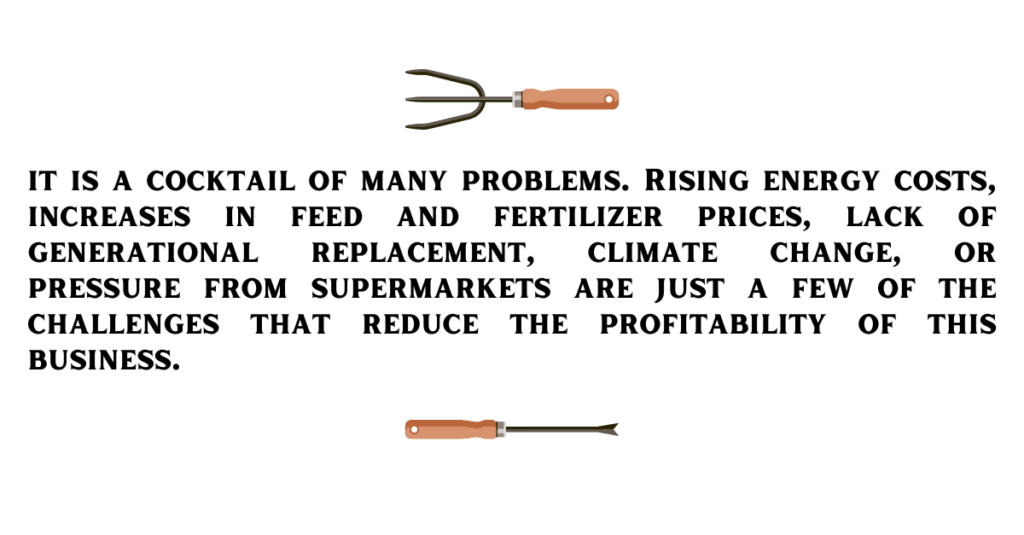
06 Jul The agrarian crisis in Spain
Did you know that Spanish farmers and stockbreeders are facing a scenario full of uncertainties and challenges? Final prices that do not cover production costs, an energy crisis that does not stop increasing direct and indirect costs and an absolute lack of generational replacement are just some of the difficulties that farmers and ranchers in our country are facing
The primary sector has been trying to make itself heard for years, raising its voices to share the structural problems that affect its businesses and, therefore, all of us. Society is oblivious to the challenges faced on a daily basis by those who have devoted their lives to this necessary yet forgotten sector. There were problems prior to the pandemic that have only worsened as a result of the war between Russia and Ukraine: the Russian invasion of the European breadbasket has had a serious impact on the global food supply chain, uncovering problems of dependence on foreign countries and leading to a lack of supply. Spain has traditionally been able to take the place of an exporting country to guarantee the availability of certain meat or agricultural products in other economies, but this does not exempt it from suffering the resulting consequences. In this case, Spain has suffered the impact of the war as much as other European nations; and in particular the primary sector is calling for solutions that can help its businesses to move forward in the face of a very unprofitable and tremendously diffuse panorama.

Firstly, the effects of climate change on the countryside are undeniable, leading to droughts that threaten crops and favors the spread of animal diseases such as African swine fever (ASF), salmonella and avian influenza (AI). The primary sector is also facing an increase in the direct and indirect costs of production, with generalized increases in:
- Agricultural prices of some products such as cereals, olive oil and sunflower. This point is closely related to the war conflict, since 41% of the corn imported into our country for livestock purposes is imported from Ukraine.
- Energy costs, which have increased by 73.9% (2022). Electricity has increased by 118.9% compared to October 2020 and by 44.5% in the case of fuels (in 2020 the diesel used in the sector ranged between 40-45 cents a liter, while now that figure rises to 90). The price of electricity is “exorbitant” according to producers, hindering drying, irrigation systems or the proper functioning of machinery.
- Price of fertilizers (+58.1%) and fodder to feed the animals (+18.2%). Since 2019, the price of fertilizers has only increased, assuming that producers have to pay 800€ per ton when a few years ago the costs did not exceed 150€ for the same amount. In the case of fodder, a farmer with 5000 heads of sheep on average fed his flock with 600€… now he needs more than twice as much.
- Self-employed and input fees, which only complicate the picture for producers.
- Labor costs, partly due to the increase in the minimum wage.
We cannot forget the difficulties that the rural world has been experiencing for decades, with structural problems that go beyond a pandemic or a military invasion. The rural world is at risk of depopulation, with the new generations going to the city and without a generational replacement or new labor force that wants to work in this sector. All this leads to a fall in the income of farmers, whose situation is not improving in the face of pressure from large chains to keep prices low, uncertainty about the value of their crops in the near future and competition with third countries. These are many factors that produce losses that can be sustained in the short term, but not in the long term, which has meant that many producers have been unable to continue their businesses or access mortgages to expand their facilities or acquire new machinery.

Farmers in our country have been demanding solutions for months to address the precariousness that exists in the sector. They propose the enforcement of the “food chain law” to ensure that prices cover production costs, the end of speculation with basic products as fertilizers, and the rejection of the import of certain raw materials that do not comply with the animal welfare or the environmental standards of the European Union.
Spain has traditionally been a producer country, characterized by a rich Mediterranean diet and top quality products. Olmeda Orígenes works closely with farmers and ranchers from all over the country, with whom they engage in conversations that are as worrying as they are necessary. The rural world and the primary sector occupy a prominent place in our hearts, and we are aware of the importance they occupy in our economy and how important it is to take care of those who dedicate their lives day by day, hour by hour to produce the best products of our gastronomy. It is necessary to listen and to take measures that favor the sector, because if the primary sector falls, we all simply fall.
Bibliography
- Aminetzah, D., & Denis, N. (2022, 26 abril). The rising risk of a global food crisis. McKinsey & Company. https://www.mckinsey.com/industries/agriculture/our-insights/the-rising-risk-of-a-global-food-crisis?cid=eml-web
- Expósito, F. (2022, 14 marzo). Las causas de la crisis agraria. Diario Córdoba. https://www.diariocordoba.com/agricultura-medio-ambiente/2022/03/14/causas-crisis-agraria-63777672.html
- Ferreiro, M. (2022, 23 mayo). Crisis ganadería: los retos a los que se enfrenta el sector este 2022. ruralvia. https://blog.ruralvia.com/crisis-ganaderia-retos-sector-2022/
- La crisis de suministros asfixia al campo español: «Si cae el sector primario, caerá el país». (2021, 23 noviembre). ELMUNDO. https://www.elmundo.es/economia/ahorro-y-consumo/2021/11/06/6186b3fdfdddff51348b45f9.html



